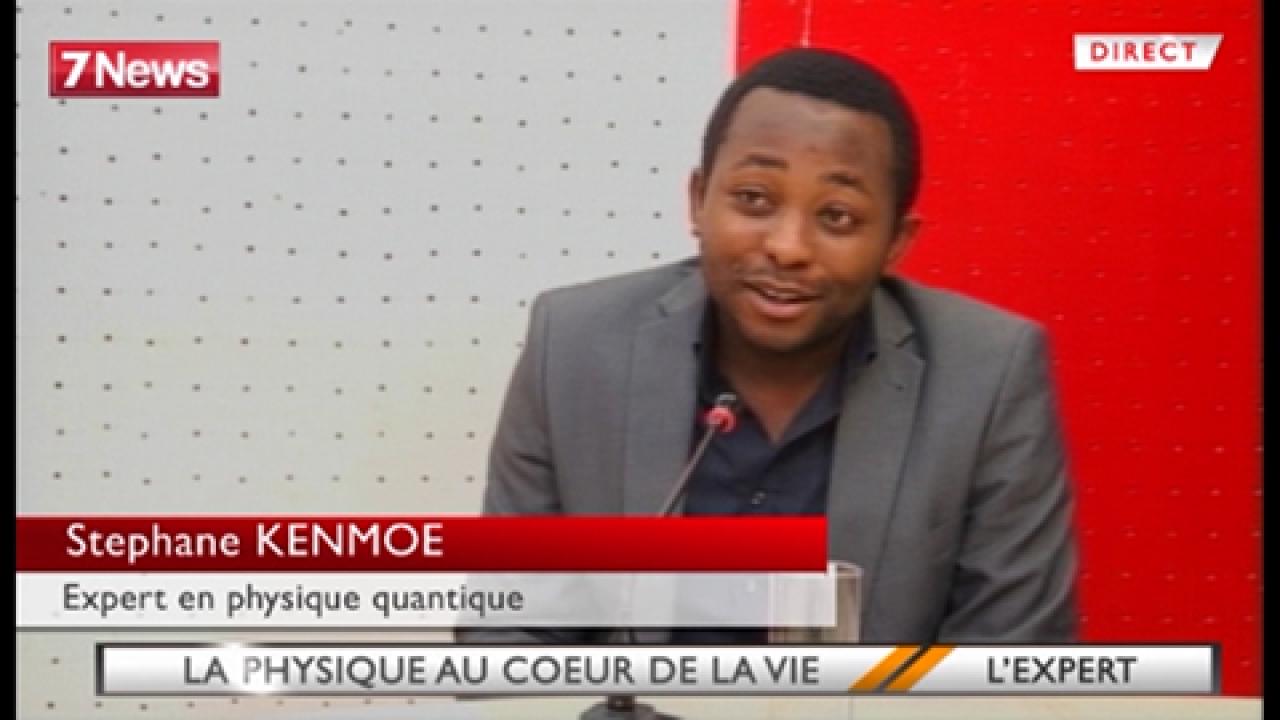
ICTP sometimes hosts science celebrities and distinguished guests, with all due ceremony, but it's rare and exciting when that celebrity is also an ICTP alumni. That happened recently when Cameroonian scientist, science communicator, and television personality Stephane Kenmoe returned to ICTP for a conference, to meet with old advisors, and to humbly enjoy the enthusiasm of fellow scientists who recognized him for his science outreach efforts. Kenmoe graduated from ICTP’s Postgraduate Diploma Programme in 2011, went on to earn his PhD at the Max Planck Institute for Iron Research, and is now in his first postdoctoral position. As well as working as a scientist, Kenmoe regularly appears on a major Cameroonian television broadcast promoting the wonders of science.
"In countries like Cameroon, people are not really motivated to do science - they don't see directly the importance of science,” explains Kenmoe. Science communication on TV usually requires eloquence, charisma, and a love of the subject, all of which Kenmoe has. "The challenge when you go on the TV is to talk about science in such a way that somebody who has not studied at science at all can see science everywhere."
A series of chance meetings and viral videos brought about the invitation to regularly appear on one of the biggest national broadcasts in Cameroon. "The first video I did was with an old classmate who is now a journalist; he invited me to speak on L'expert, a major TV program in Cameroon. I talked about general physics, in transportation, in medicine, and in other applications. And then he posted it on YouTube and people were very enthusiastic," Kenmoe explains. That led to invitations to speak on several other regular broadcasts. Fame ensued, especially among science-interested Cameroonians. Indeed, while at ICTP recently for a workshop, Kenmoe caused excitement among Cameroonian student attendees who have watched his TV appearances. He sometimes joins football stars, comedians, and popular musicians on broadcasts when he returns to Cameroon for holidays. "I talk about the physics of music, of sports—I try to make science the star, to make it just as interesting and attractive to the people." From then on, he has often been stopped by fans with selfie requests in the streets in Cameroon.
Kenmoe hails from Dschang, Cameroon, and his love for science started young; he was constantly wondering about the world around him. "My friends used to call me little professor," he laughs. His curious nature was encouraged by his family, which includes many scientists. His sister is studying physics at the Marie Curie Institute in Paris, his father is an air traffic controller at Yaounde international airport in Cameroon, his aunt is a medical doctor and many of his uncles are university professors. "In a family of many traders it's very easy to become a trader," Kenmoe says. Physics has always been interesting to him, but there are specific reasons why he is a theoretician. "These days you can do calculations all over the world, I don't need to be sitting here to have computational time, I can send things off and get the results back. Experimental physics is very expensive, and I come from Africa; there are many people there who live on less than a dollar a day. It doesn't make sense to put money towards experimental equipment when people are hungry." Kenmoe smiles, "I don't like this black box science that experimentalists do, I want to know all the details of why what is happening is happening. Besides, experimentalists often need theoreticians to understand what they are seeing."
Today, Kenmoe's research field aligns closely with the topic of the conference he attended at ICTP, on Spectroscopy and Dynamics of Photoinduced Electronic Excitations. His post-doctoral research at Universität Duisburg-Essen focuses on the minute workings of water, the inorganic chemistry involved in the quest to free hydrogen from water using the energy of sunlight, an abundant resource in tropical Cameroon. "If you are able to split water you can have hydrogen, a renewable energy source," says Kenmoe. Hydrogen created using sunlight would be a huge boon for a world looking for a fossil fuel replacement quickly. Chemical physicists, including Kenmoe, are working with various catalysts to assist in the light-induced excitations of electrons.
Several of ICTP's physicists do similar work, including Ralph Gebauer, who served as Kenmoe's advisor for his Diploma studies. "Stephane is working with titanium dioxide, like we do, but he focuses on nanotubes and the molecular dynamics of how water interacts with different surfaces. He has become an expert in seeing how water is forming layers at surfaces and interfaces with materials, part of the larger water splitting research field."
Physics and science communication are very important to Kenmoe. "One of my goals with science communication is to convince people that they are living in science, that they are living in physics." Kenmoe hopes to help his country in many other ways besides motivating the students from the television: he hopes to organize workshops and encourage other students to pursue higher study, especially at ICTP. "Scientists can survive anywhere," he says, "now I hope to help the people understand how many applications science has."
---- Kelsey Calhoun
















